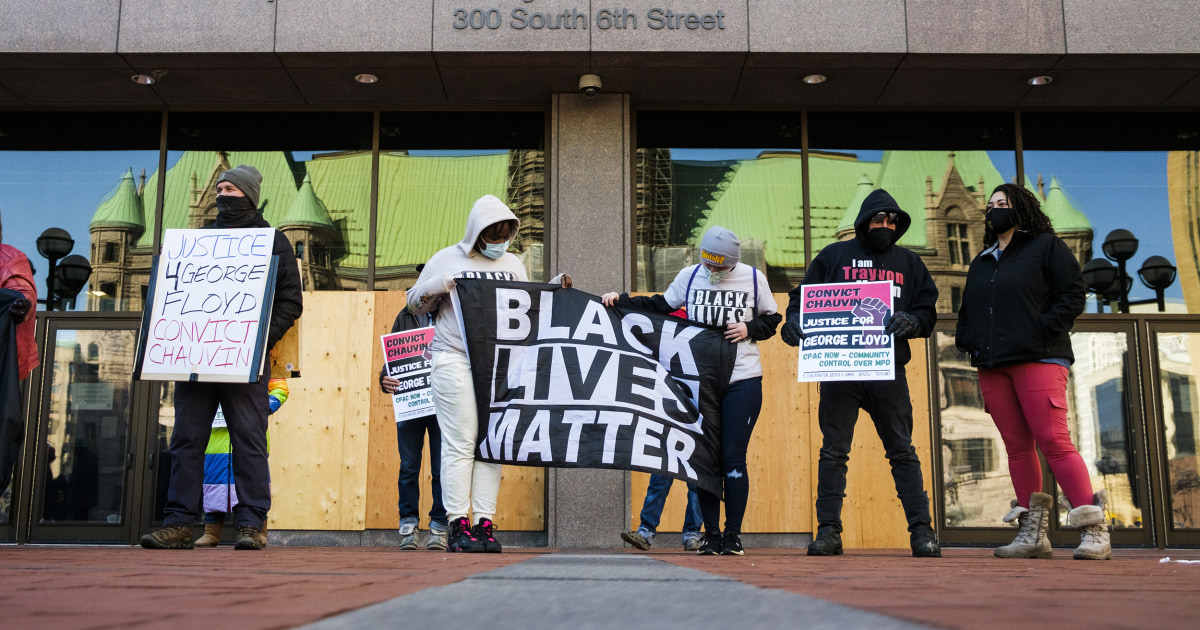After facing a negative reaction, the city of Minneapolis canceled plans to pay social media influencers to share messages approved by the city to combat misinformation during the trials of the four police officers accused of the murder of George Floyd.
The city faced criticism on social media and from residents and community groups after details about the program were discussed at a Minneapolis City Council meeting on Friday.
In a letter sent Sunday night to elected officials and obtained by NBC News, the city’s communications director, Greta Bergstrom, and the director of neighborhood and community relations, David Rubedor, said they would not move forward with the strategy.
“While we believe and support the intent of this recommendation, we saw that the impact caused damage,” they said. “We are sorry and we recognize that we will have to work to repair the damage that has been caused.”
During a press conference on Monday, Rubedor said that the Department of Community and Neighborhood Relations recommended that social media influencers be used as part of the Joint Information System with the aim of creating multiple channels – on-site and online. – “to share timely and relevant information” with the public during the trials.
“In our experience, we have repeatedly heard that many residents are not connected to the city’s traditional information sharing routes and we often hear from residents that they have not been informed of significant information or resources available,” he said. “With that, we are constantly looking for ways to ensure that all of our residents are informed about timely and accurate information in ways that are meaningful to them.”
In retrospect, he said, the term “social media influencer” does not reflect “what we are asking our partners for and this has caused confusion in the community”.
“It was never about trying to persuade or change public opinion about a particular message,” he said. “But it was about spreading important information quickly and equitably.”
Under the program, the city is said to have signed contracts with six social media influencers who “are considered messengers of trust” with strong social media presence to share city-approved messages with African American, East African, Hmong, Native American and Latin, officials said. The influencers reportedly received $ 2,000 each, city spokeswoman Sarah McKenzie said on Monday.
The program was approved by the City Council in preparation for the trial of Derek Chauvin, the former Minneapolis police officer who was seen on video kneeling for several minutes on Floyd’s neck. Chauvin faces charges of wrongful death and wrongful death. The selection of the jury is scheduled to begin on March 8. The other three dismissed officers involved in Floyd’s death are expected to go to trial in August.
McKenzie said many of the people who opposed the plan – online and locally – misinterpreted his intentions.
“The intention really is to keep everyone in the city safe by sharing timely and critical public information and recognizing that not everyone gets their news from the local TV or the newspaper,” she said in a telephone interview on Monday.
Floyd’s death sparked global protests, some of which became violent. The stores in Minneapolis were looted and set on fire and officers used tear gas and fired at the crowds. National Guard troops were dispatched to help restore order.
McKenzie said city officials are paying special attention to residents’ criticisms.
“The city is listening to the feedback. We are in a difficult position,” said McKenzie. “We realized that it was a horrible year for people in our city and there is suspicion in the government.”
Influencers would be tasked with sharing information on their Twitter or other city social media accounts about the closure of roads and buildings, as well as dispelling misinformation.
During a City Council meeting on Friday, Mark Ruff, the Minneapolis city coordinator, said officials want to make sure “we disclose what’s going on with the trials and what are the options for the community to get involved, especially communities that are not using, perhaps, the city’s website or other traditional media sources where disinformation will also be disclosed. “
McKenzie said Monday that the irony is that an initiative designed to dispel rumors and lies has been misinterpreted.
“I think sometimes, when people saw the term influencer, they misinterpreted what the plan was,” she said.


